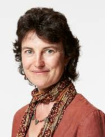Strategies for early detection of cancer
Cancer is often detected at a late stage when treatment options are limited and associated with toxicity. Detecting cancer earlier can lead to significantly improved outcomes but is also challenging to achieve the precision required to avoid over diagnosis or missed cases. In this talk I will describe the sorts of strategies that are being proposed from imaging to proximal sampling as well blood tests and will use early detection of cancer of the oesophagus as a case example.
|
Rebecca FitzgeraldMRC Cancer Unit |
Rebecca is Professor of Cancer Prevention at the University of Cambridge. Rebecca is a Programme Leader at the University’s MRC Cancer Unit and she practices medicine as an Honorary Consultant in Gastroenterology at Cambridge University Hospitals NHS Trust. She graduated from Cambridge University, performed a research degree at Stanford University, California and then undertook specialist clinical training and postdoctoral research at Barts and The London Hospitals before moving back to Cambridge in 2001.
Rebecca leads a University wide programme in the Early Detection of Cancer. The focus of her own research is to improve methods for early detection of oesophageal cancer through better understanding of the molecular pathogenesis. Rebecca and her team developed the CytospongeTM and associated assays including TFF3. This work has been awarded several prizes including the Westminster medal 2004, NHS Innovation prize 2011, BMJ Gastro team of the year award 2016 and the Jane Wardle Prize in 2018. She was elected a Fellow of the Academy of Medical Sciences in 2013 and is an NIHR Senior Investigator. https://www.mrc-cu.cam.ac.uk/research/rebecca-fitzgerald
Rebecca enjoys teaching and communicating science to the public. She is a Fellow in Medical Sciences at Trinity College, Cambridge and is a Fellow of the Institute for Learning and Teaching.


